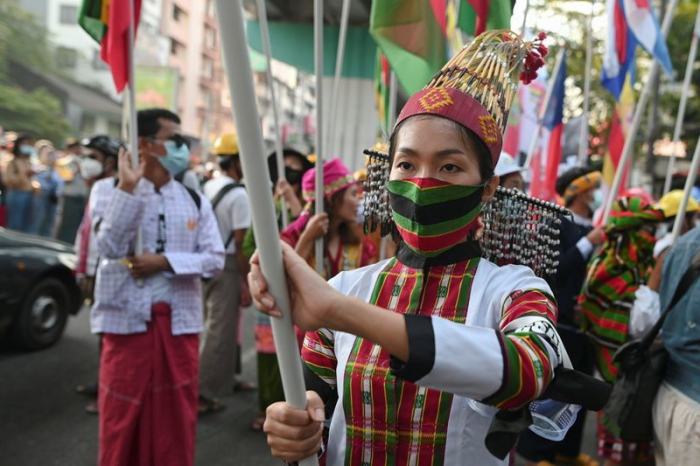Protests against the Feb. 1 coup that overthrew the government of the veteran democracy campaigner Suu Kyi have shown no sign of dying down, with demonstrators sceptical of a military’s promise to hold a new election and hand power to the winner.
Police fired rubber bullets at protesting shipyard workers in the second city of Mandalay and one person was slightly hurt, pictures on social media showed.
A young woman protester died on Friday after being shot in the head last week as police dispersed a crowd in the capital, Naypyitaw, the first death among opponents of the coup in the demonstrations.
The army says one policeman has died of injuries sustained in a protest.
The United States was saddened by the protester’s death and condemned the use of force against demonstrators, a State Department spokesman said.
On Saturday, young people in the main city of Yangon carried a wreath and laid flowers at a memorial ceremony for the woman, Mya Thwate Thwate Khaing, while a similar ceremony of remembrance took place in Naypyitaw.
“The sadness from her death is one thing, but we’ve also got courage to continue for her sake,” student protester Khin Maw Maw Oo said at the Naypyitaw ceremony.
The demonstrators are demanding the restoration of the elected government, the release of Suu Kyi and others and the scrapping of a 2008 constitution, drawn up under military supervision, that gives the army a major role in politics.
For those taking part in a procession in Yangon of colourfully dressed ethnic minority people, unity within a federal system is also a key demand.
“The military governs with rules that divide ethnic groups. We can’t let that happen again,” said Naw Eh Htoo Haw, a member of the Karen minority.
Insurgencies by ethnic minority forces seeking autonomy have simmered since Myanmar’s independence from Britain in 1948, and the army has long proclaimed itself the only institution capable of preserving national unity.
Suu Kyi, 75, like the top generals, is a member of the majority Burman community.
Her government promoted a peace process with insurgent groups but she faced a storm of international criticism over the plight of the Muslim Rohingya minority after more than 700,000 fled a deadly 2017 army crackdown.
Insurgent groups that have signed a national ceasefire made clear their opposition to army rule, saying in a statement they would aim to “coordinate with local and foreign forces” and the international community to “eliminate dictatorship”.
‘STAND TOGETHER’
The army seized back power after alleging fraud in Nov. 8 elections that Suu Kyi’s National League for Democracy swept, detaining her and others. The electoral commission had dismissed the fraud complaints.
The protests have been more peaceful than the bloodily suppressed demonstrations during nearly 50 years of direct military rule up to 2011.
Several thousand protesters gathered in the northern town of Myitkyina on Saturday and faced off with police before dispersing. Police and soldiers have in recent days used batons and rubber bullets to break up crowds in the town.
Crowds marched again through the ancient capital of Bagan and in Pathein in the Irrawaddy river delta, pictures on social media showed.
In Mandalay, writers, poets and railway workers held peaceful marches before police fired rubber bullets to disperse striking shipyard workers. Protesters and police played cat and mouse through the city’s riverside streets for hours.
In addition to the protests, a civil disobedience campaign has paralysed much government business.
The United States, Britain, Canada and New Zealand have announced limited sanctions, with a focus on military leaders, including travel bans and asset freezes.
Japan and India have joined Western countries in calling for democracy to be restored. Japan’s ambassador, Ichiro Maruyama, speaking to protesters outside his embassy, called for the release of Suu Kyi and others and appealed to the army to resolve things peacefully.
There is little history of Myanmar’s generals giving in to foreign pressure. They have closer ties to China and to Russia, which have taken a softer approach than Western countries.
Junta leader Min Aung Hlaing was already under sanctions from Western countries following the crackdown on the Rohingya.
Suu Kyi faces a charge of violating a Natural Disaster Management Law as well as charges of illegally importing six walkie-talkie radios. Her next court appearance is on March 1.
Myanmar’s Assistance Association for Political Prisoners said 546 people had been detained, with 46 released, as of Friday.
More about: #Myanmar
















































